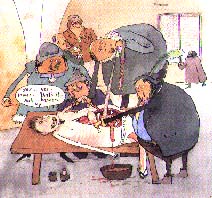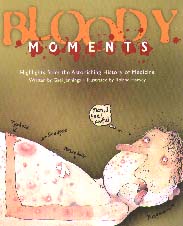|
________________
CM . . . .
Volume VII Number 18 . . . . May 11, 2001
excerpt: Mabel shuffles to the front door and picks up the slim package that just plopped through the through mail slot and screams. It's SLIMY! Flat, square, shiny and wet-feeling; it's an envelope with dark red stains and white glistening bits sticking out of it and it smells sort of sweet. Max [the dog] snuffles. His nose comes up and he growls but Mabel's heart is pounding now. On the slimy envelope she reads, "The Guts of Human Life."  Young Mabel, who is confined to the house while recovering from a cold, receives a mysterious
CD-ROM in the mail; it's slimy and gooey, and it looks blood drenched (eek!). However, she
cannot resist putting it into her computer, and, as the monitor begins to glow, two deep red
images appear; one says Good Luck and the other Bad Luck. Clicking on Good Luck, she is
sucked into a dark cold scary night in the year 1536, and, compliments of Gael Jennings, she
begins her gross-out tour of medical history. It is easy to imagine the pustulance and pestilence
she experiences, which illustrator Roland Harvey takes glee in graphically portraying for us.
Young Mabel, who is confined to the house while recovering from a cold, receives a mysterious
CD-ROM in the mail; it's slimy and gooey, and it looks blood drenched (eek!). However, she
cannot resist putting it into her computer, and, as the monitor begins to glow, two deep red
images appear; one says Good Luck and the other Bad Luck. Clicking on Good Luck, she is
sucked into a dark cold scary night in the year 1536, and, compliments of Gael Jennings, she
begins her gross-out tour of medical history. It is easy to imagine the pustulance and pestilence
she experiences, which illustrator Roland Harvey takes glee in graphically portraying for us.
Through most of history, the course of human life has been nasty, brutish and short, and what passed for medicine wasn't all that helpful in ending suffering and disease. Jennings, a British research scientist, points out in her offbeat history that many of the medical advances which led to medicine's conquering of illnesses and pain came through luck rather than skill and imagination over hidebound dogma, and, in particular, by women such as Florence Nightingale and Marie Curie. Because this is the historical nature of medical progress, Jennings leaves us with the question of how modern medicine, which is exploring the farthest reaches of possibilities in cloning, human-animal transplantation and pharmacology, ought to be bound by ethical conventions. This idea is left hanging, however, and once introduced ought have been explored in greater depth. The saturation of blood and guts and the descriptions of diseased body parts become more and more tedious with each page. Taste, however, is not the issue with this book. Whether it will stimulate students to move on to more advanced materials on the subject is questionable. Recommended with Reservations. Ian Stewart is a frequent contributor to CM and the book review pages of the Winnipeg Free Press.
To comment on this title or this review, send mail to cm@umanitoba.ca.
Copyright © the Manitoba Library Association.
Reproduction for personal use is permitted only if this copyright notice
is maintained. Any other reproduction is prohibited without
permission.
Published by
TABLE OF CONTENTS FOR THIS ISSUE - May 11, 2001.
AUTHORS |
TITLES |
MEDIA REVIEWS |
PROFILES |
BACK ISSUES |
SEARCH |
ORDER |
CMARCHIVE |
HOME
|
